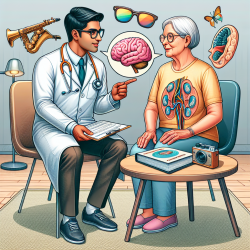In an era where the elderly population is increasing, the demand for specialized healthcare services, including speech-language pathology, is more crucial than ever. However, the current scope of speech-language pathology in relation to elderly care remains limited, necessitating a reevaluation and expansion of services to meet the unique communicative needs of this demographic. Drawing insights from Mark Landy's research, "Redefining The Role of the Speech-Language Pathologist in Relation to the Elderly Adult Population," this blog explores strategies for practitioners to enhance their skills and services for the elderly.
One of the primary challenges highlighted is the profession's current narrow focus on traditional speech and language disorders, such as aphasia, dysarthria, and voice problems, which overlooks the broader communicative needs of the elderly. This oversight is partly due to prevalent stereotypes and misconceptions about the elderly's desire and capacity for communication, as well as a lack of specialized training in gerontology within speech-language pathology programs.
To address these issues and improve care for the elderly, the following strategies are proposed:
- Expanding Professional Education: Incorporating gerontology and the study of aging into speech-language pathology curricula as a core component, rather than an elective, can equip future practitioners with a deeper understanding of the elderly's communicative needs and challenges.
- Adopting a Holistic Approach: Moving beyond a pathology-specific model to a more comprehensive view of communication that includes psychosocial factors, and cognitive and physical health, can lead to more effective and personalized care plans.
- Interdisciplinary Collaboration: Working closely with professionals in gerontology and other related fields can foster innovative treatment strategies and research, benefiting both speech-language pathologists and the elderly population.
- Emphasizing Indirect Therapy: Developing environmental modifications and group activities that encourage communication within institutional settings can significantly improve the quality of life for elderly individuals with communicative disorders.
- Advocating for the Elderly: Speech-language pathologists must take an active role in challenging negative stereotypes about aging and communication, advocating for the needs and capabilities of the elderly.
By embracing these strategies, speech-language pathologists can significantly enhance their impact on the elderly population, fostering more meaningful and effective communication and, by extension, improving overall quality of life. This not only requires a shift in perspective and practice but also a commitment to ongoing research and professional development in the field of gerontology.
The need for specialized services for the elderly is clear, and speech-language pathologists are uniquely positioned to meet this demand. By expanding their roles, embracing new methodologies, and working collaboratively across disciplines, they can ensure that the elderly receive the comprehensive and compassionate care they deserve.
To further explore this topic and implement the outcomes of the research presented, practitioners are encouraged to engage in further research and professional development opportunities. For those interested in delving deeper into the issues and solutions discussed, reading the original research paper provides valuable insights and guidance.
To read the original research paper, please follow this link: Redefining The Role of the Speech-Language Pathology in Relation to the Elderly Adult Population.










